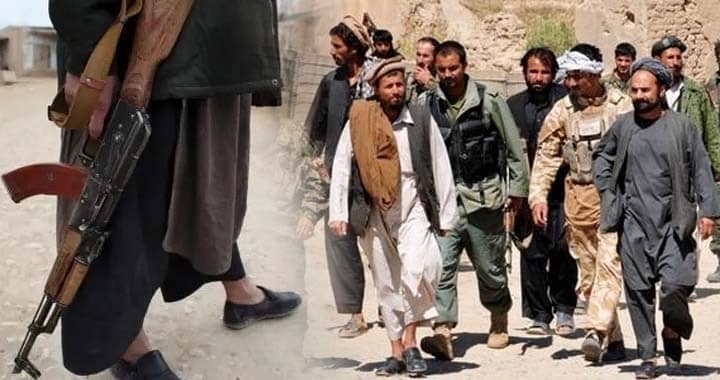While the Pakistani Taliban (TTP) have long been synonymous with anti-democratic extremism and a deep-rooted hostility toward modern education, their ideological mentors, the Afghan Taliban, are proving no different, if not worse. In the name of religion, they continue to brand democracy as heresy, oppose modern knowledge, and actively suppress any form of progressive thought, all while promoting their outdated and oppressive ideology.
The Taliban’s so-called governance is defined not by service delivery or stability but by systemic repression, economic displacement, and brute force. People are being forcibly evicted from their homes and deprived of livelihoods, while shops, markets, and entire local economies are being demolished and dismantled in the name of “order.”
A case in point occurred just yesterday in Mazar-i-Sharif, where furious traders took to the streets in protest after Taliban authorities demolished their shops. Chanting “Death to Traitors!”, the demonstrators expressed the growing public outrage against the regime’s high-handedness and disregard for people’s means of survival.
And while economic destruction and repression continue, the Taliban’s brutality has crossed yet another moral and human threshold: in the Panjshir Valley, reports have emerged that the Taliban are now abusing the bodies of their opponents even after death, desecrating corpses, a practice that harks back to the darkest chapters of pre-Islamic ignorance.
Such grotesque acts; un-Islamic, inhumane, and illegal by every standard, are a violation not only of Islamic principles but also of the laws of war and universally accepted human rights. Every society in every era has condemned this kind of behaviour, and history consistently shows that regimes that rely on cruelty and terror ultimately provoke their own downfall. When the oppressed masses rise, they do so with a fury that sweeps away everything in its path, thrones, titles, and legacies alike.
This latest incident in Panjshir is not an isolated case. The Taliban’s prisons remain notorious for torture and inhumane treatment, including serious allegations of gang rape and sexual violence by both male and female Taliban jailers. The regime continues to carry out targeted assassinations of former government officials, alongside widespread suppression of dissent, especially among women and ethnic minorities.
Mounting Instability Confirmed by UN Report
A recent United Nations report presented to the Security Council highlights just how unstable Afghanistan has become under Taliban rule. According to the findings, the country witnessed a 9% increase in security incidents between May and July 2025 compared to the same period last year. A total of 2,658 incidents were recorded, confirming that nearly four years into Taliban rule, Afghanistan remains far from stable.
Resistance groups such as the Afghanistan Freedom Front (AFF) and the National Resistance Front (NRF) have claimed responsibility for dozens of attacks, though only 19 have been independently verified. While these groups are not yet posing a major strategic threat, their consistent and growing presence signals a widening resistance that the Taliban can no longer ignore.
The report also noted a decline in IS-KP activity, though the group remains capable of horrific attacks; such as the June 14 beheading of a Shiite mosque imam in Badakhshan, where assailants left behind an IS-KP flag. The Taliban have launched counterterrorism operations in Kabul, Kunar, and Nangarhar, reportedly killing several IS-KP operatives. But these efforts have done little to reassure the population or change the fact that Afghanistan’s security situation remains dire. And above all, the main threat emanating from Afghanistan, not only for regional security and stability but also to the global peace, is the presences of of around 23000 foreign terrorist affiliated with over 20 terror organisations.
Women Barred from Aid Work: UN Chief Sounds Alarm
The crisis is further compounded by the Taliban’s systematic erasure of women from public life. In a strongly worded statement, UN Secretary-General António Guterres condemned the Taliban’s recent decision to ban Afghan women from working with UN agencies, calling it “indefensible and catastrophic.”
“Denying women the right to contribute to humanitarian relief is not only unacceptable but an act of self-sabotage for Afghanistan itself,” Guterres warned, noting that this move threatens the effectiveness of humanitarian operations across the country. The UNHCR has already suspended cash support for returning refugees, and other aid organisations have expressed fears that operations may soon become unsustainable.
The Secretary-General made clear that this is more than just a bureaucratic decision, it’s a direct attack on humanitarian principles and a deliberate expansion of the crisis. “By preventing women from delivering aid, the crisis expands from deprivation to deliberate obstruction,” he said.
Since 2021, the Taliban have enacted sweeping restrictions on women’s education, employment, and mobility, effectively reducing half the country’s population to second-class status. Rights groups and humanitarian agencies warn that this approach threatens the very survival of aid delivery systems in Afghanistan, particularly to the most vulnerable: women and children.
Conclusion: A Regime on the Brink
What we are witnessing is not simply a failing government, it is an unfolding tragedy of ideology, cruelty, and incompetence. The Taliban’s rule is marked by oppression rather than service, repression instead of reform, and fear instead of hope.
Their crackdown on media, their decision to suspend fibre-optic internet and Wi-Fi access across the country, and their systematic targeting of all forms of dissent reflect not strength, but paranoia and fear.
The Taliban must learn from history: no regime that kills, tortures, and silences its people survives unchallenged. If they are incapable of governing for all Afghans, they must at least not stand in the way of those who can. The need for an inclusive, representative political process is no longer a diplomatic talking point, it is the only way forward for a nation on the verge of collapse.
The longer they resist this reality, the more catastrophic the consequences will be, not only for the Taliban themselves but for Afghanistan and its future generations.





